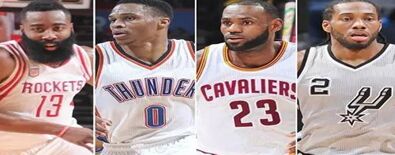赢的偏执的倔强,输的盲目的迷惘
|
Thursday's All-NBA announcement had far-reaching implications beyond bragging rights, thanks to the new designated veteran-player extension rule that rewards those who are named MVP, Defensive Player of the Year or to any of the three All-NBA teams. Conversely, a snub cost some star players millions. The big winners included James Harden of the Houston Rockets, Russell Westbrook of the Oklahoma City Thunder and John Wall of the Washington Wizards. Meanwhile, Paul George of the Indiana Pacers and Gordon Hayward of the Utah Jazz were left outside of the top 15 and will miss out financially.
Cash-Money Winners Via his back-to-back Most Valuable Player awards, Stephen Curry is eligible to re-sign with the Golden State Warriors as a designated veteran on a contract starting at 35 percent ($35.4 million) of next season's projected salary cap ($101 million)—for a total of $205 million over five years. Curry, who was named to the All-NBA Second Team, cannot be another team's designated player. The most an opposing franchise can offer is 30 percent of the cap ($30.3 million) over four years or $130.3 million—a $75 million gap that will all but guarantee the All-Star returns to Golden State. Named to the All-NBA Third Team, Wall can sign a designated extension in July, adding on four more seasons to the $37.2 million he has remaining through 2018-19 on his current contract. He'll be eligible to earn 35 percent of the 2019-20 salary cap, locking in at least another $165 million. All-NBA First Team winners Westbrook (Oklahoma City Thunder) and Harden (Houston Rockets), who both had their contracts restructured and extended last summer, will both be eligible for new extensions this summer, specifically grandfathered in by the NBA and the players union. Westbrook can extend his deal starting with the 2018-19 season at approximately $207.1 million for five additional years. Harden, who has non-option seasons left on his contract, can now add on four years like Wall (roughly $165 million). Struck Out, Looking Players qualify for the designated veteran-player extension or contract by winning MVP in one of the three seasons prior to signing. Additionally, a player gains eligibility by winning Defensive Player of the Year or by being named to any of the All-NBA teams in the campaign immediately before signing or in two of the three prior seasons. The player must be entering his eighth or ninth year and have been on the same team since no later than their fourth season in the NBA. George missed out on a five-year extension starting with the 2018-19 season at a projected $207.1 million. He could still qualify next July, but he and the Pacers wouldn't know the award voting until at least May. Even if he doesn't reach that goal, George can re-sign with the Pacers for five years at a projected $177.5 million or leave for another team for four years, $131.6 million Hayward's missing out will undoubtedly lead the forward to opt out of his final year at $16.7 million to explore free agency. He can re-sign with the Jazz for $175.7 million over the next five seasons or join another franchise for $130 million over four. Another option would be for Hayward to re-sign for a single season at $30.3 million (or two years with a player option on the second at $63 million) to see if he qualifies next summer for the designated contract. The Los Angeles Lakers appear to have their sights set on George in 2018 or sooner via trade, per The Vertical's Adrian Wojnarowski. The Boston Celtics may look to steal Hayward as a free agent this summer, per Wojnarowski. Future Big-Money Earners Looking ahead, Kawhi Leonard of the San Antonio Spurs will qualify for the extension in July 2018 with his second straight All-NBA First Team honor. Leonard will be able to sign for five years based on the 2019-20 salary cap, worth at least an estimated $213 million. Celtics guard Isaiah Thomas (All-NBA Second Team) took a step toward the designated player extension but won't be eligible until 2019, provided he re-signs on a short-term deal in 2018 and continues to earn similar accolades. All-NBA First Team winners LeBron James (Cleveland Cavaliers) and Anthony Davis (New Orleans Pelicans), second-team winners Rudy Gobert (Jazz), Giannis Antetokounmpo (Milwaukee Bucks) and Kevin Durant (Warriors), and third-team winners Draymond Green (Warriors), Jimmy Butler (Chicago Bulls), DeMar DeRozan (Toronto Raptors) and DeAndre Jordan (Clippers) won't qualify based on either their years of service in the league or the timing of their existing contracts.
更多精彩内容请关注微信公众号、新浪微博:篮球英文堂 |









